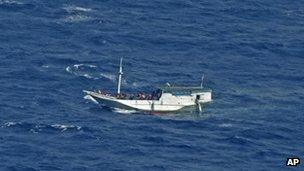Australia asylum camp in Nauru 'cruel and degrading'
- Published

Australia has seen an increase in asylum seekers arriving by boat in recent months
Conditions at an Australian asylum camp on the Pacific territory of Nauru are "cruel" and "degrading", Amnesty International says.
Representatives of the rights group spent three days at the offshore processing camp, now home to 386 men.
Amnesty found tents crowded, hot and wet, with no privacy. Uncertainty over detention length had also led to "dire" mental health, it said.
In response, officials said amenities and support services were available.
Australia reintroduced offshore processing in September in a bid to deter asylum seekers from making the dangerous journey to Australia by boat. In recent months the number of arrivals has climbed.
Another Australian processing centre opened earlier this week on Manus Island in Papua New Guinea.
Both the ruling Labor party and the opposition have suggested that asylum seekers may have to spend up to five years in offshore camps while their claims are processed.
'Severe punishment'
In Nauru, Amnesty found in its report, external, the detainees were living in a camp 150m by 100m, in 16-man or 5-man tents that contained closely-packed stretcher beds and plastic containers for clothes.
Temperatures reached 40 degrees in the compound, with high humidity, and there was little shade, as well as no privacy.
When the delegation was there, part of the camp flooded due to monsoon rains, and both tents and bedding were wet.
A lack of information about a timeline for processing their asylum claims was exacerbating detainees' anguish.
"This is like severe punishment for criminals. In Australia, I think criminals are treated better than this. Even a criminal knows how many years they will be in jail but we have no idea," Amnesty quoted one of the detainees as saying.
Nine men were on hunger strike, including one who had not eaten for more than 40 days, it said.
Dr Graham Thom of Amnesty said there was clear evidence that the camp had been "erected in haste, with no consideration for the individuals languishing in such squalid conditions".
The rights of the detainees, Amnesty said, were being breached by both the Australian and Nauru governments. Transfers to the camp should stop immediately and the centre should be closed, it said.
Responding to the report, a government spokesman said it was "no surprise" that Amnesty did not agree with the processing centre, saying the groups "opposition to offshore processing and indeed immigration detention was established long before this facility was".
Food and water were available at all times, as was access to medical care and mental health support services when required, the spokesman said. Recreational activities were also available.
On processing detainees' claims, Australia was working closely with the Nauru government and expected to begin assessments early next year, the spokesman said.
The government decided to re-establish offshore processing camps in August, after ending the policy - known as the Pacific Solution - in 2008.
The move, recommended by an expert panel, came in response to a sharp rise in the number of asylum seekers arriving by boat.
- Published10 October 2012
- Published14 September 2012
- Published23 August 2012
- Published15 August 2012
- Published13 August 2012